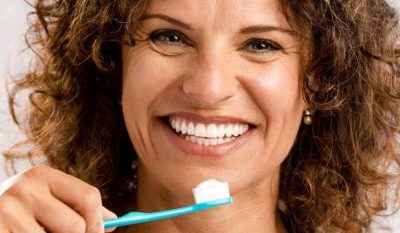The mouth is a great signpost for a patient’s broader health and can even indicate when other health issues are on the horizon. For instance, it’s very common to see the impact of menopause and hormonal changes on a woman’s teeth and gums as she gets older. While every patient is different and age itself can lead to a higher likelihood of cardio and periodontal disease, oral health for older women often suffers due to saliva drying up in the mouth with the onset of menopause.
A dry mouth can lead to dental disease
Of course, a dry mouth can be the result of a number of different factors, but it is, unfortunately, commonly associated with hormonal changes. In turn, when a patient’s mouth is dry, the benefit of the immunity cells present in saliva that defend against tooth decay and gum disease is lost. Put simply, if your mouth is dry, there’s more bacteria present.
That said, it’s important to note that oral dryness isn’t a given. Just because a patient is menopausal, it doesn’t automatically mean that dry mouth and tooth decay will result. Every patient is different.
Osteoporosis and your teeth
It can be a vicious cycle. But we’re now aware that hormone replacement therapy, which responds to a reduction in oestrogen at menopause, can increase a patient’s risk of osteoporosis. Previously, osteoporosis was often treated by a category of drug called bisphosphonates. Those drugs carried the complication of occasionally causing osteonecrosis of jaw after procedures like dental extractions.
To be clear, the prospect of osteonecrosis of the jaw for patients taking bisphosphonates is minimal. But it’s still something about which dentists need to be aware and vigilant. It’s also why it’s important for your dentist to take a detailed medical history. This will include what medications you’ve taken and when the next dose is due.
Plus, if someone is about to start bisphosphonates, a doctor will recommend that the patient sees a dentist first. The dentist will check whether he or she will need to remove any teeth in the near future. If so, your dentist will have to treat those teeth before that therapy starts.
Although nobody wants to lose their teeth, people who are not on bisphosphonates can afford to have teeth extracted without those risks. Which just goes to amplify the importance of good oral hygiene and management for affected patients.
Happily though, it’s a lot more common these days for a drug called Prolia to be prescribed to treat osteoporosis. Prolia carries less risk of bone necrosis.
Oral health for older women requires more work from you
As people get older, irrespective of gender, there’s often more oral management required by virtue of more wear and tear on teeth and gums. For example, a patient who may have brushed their teeth twice a day for much of their life will often find that their regime is no longer sufficient when they reach their 50s. That’s when the use of interproximal-brushing tools like Piksters and flossing becomes important.





